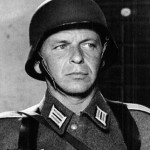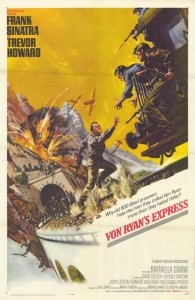Why did 600 Allied prisoners hate the man they called Von Ryan more than they hated Hitler?
Frank Sinatra is known as an artist of many talents, but usually he is thought of as the classic crooner to end all crooners. Although he won some acclaim as an actor, this most often comes in a deservedly secondary place in his repertoire. Released in a busy year for Sinatra (None But the Brave and Marriage on the Rocks were also released that year) Von Ryan’s Express as expected showcases the star in a fairly weak cast, with the notable exception of Trevor Howard.
The only other star of note is Trevor Howard, who yet again seems perfectly fine playing second fiddle- albeit a masterful fiddle it is. Howard is his usual gruff and rather standoffish self as Major Fincham, the senior (and commanding) British officer in the camp on Colonel Ryan’s (Sinatra) capture and subsequent incarceration.
 If one looks there is quite a bit of similarity between Fincham and Colonel Nicholson- and actually even Ryan and Nicholson, the key player in 1957’s Bridge on the River Kwai. Both characters are quite stodgy English types who do everything by the book. Thankfully there have been movies beyond these two which depict a less stereotypical view of the British military machine.
If one looks there is quite a bit of similarity between Fincham and Colonel Nicholson- and actually even Ryan and Nicholson, the key player in 1957’s Bridge on the River Kwai. Both characters are quite stodgy English types who do everything by the book. Thankfully there have been movies beyond these two which depict a less stereotypical view of the British military machine.
The storyline is nothing special and really boils down the the classic POW escape thriller but it is done quite well. The on train setting also lacks in originality but trains have always done well as settings for suspense and action – (From Russia with Love and The Train come to mind first.)
There are a few twists in the story which are a bit unique for the day. Von Ryan actually doesn’t survive the picture. It was quite rare for the lead actor and main character of a film of this time period to go into dirt farming. Even more surprising is that in the book on which the film is based Von Ryan survives.
Technically the film is well done. For the most part actual trains were used and any model shots are pretty hard to discern. There is the usual epidemic of “fainting Germans” during the battle scenes. They just casually fall down without any discernible damage. Again, this is the mid 1960s, but perhaps better acting or special effects would have helped out a bit.
Again, for the most part nothing new but it is done in a very well- a great film for a rainy afternoon. Just don’t expect any deeper symbolism or hidden messages: it’s just a good potboiler. It isn’t based on any historical fact, so don’t tie it back that way either.
Not a magic film, but not tragic either. On the cusp of “A list.”
